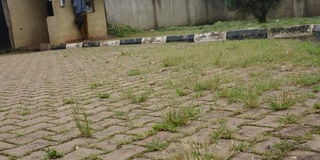Ways to prevent weeds in your pavers

One way to get rid of weeds is to kill them with detergent before uproooting./PHOTOs/Shabibah Nakirigya
What you need to know:
Weeds in the cracks of your paved compound are not just an eyesore, they can be tricky to eliminate once they take root.
Weeds and mold in the cracks of the compound paving are some of the main problems that homeowners face and the compound expert explains how you can prevent them:
Remove weed manually
Mr Eriasa Nkoyoyo, a compound innovator, says that the first and easiest way to eliminate weeds and mold is to remove them manually, something you can do in your free time.
“You have to make sure that you remove any grass or weed which grows between your pavers. Before removing the grass you can pour hot water so that you kill all the roots because it does not leave a toxic residue underground, “he says
Mr. Nkoyoyo adds that it is better to kill the grass before removing it and if you do not have other means to kill the weeds, you can use dish soap, which ispoured in the joints of the pavers. Within a short-time, the grass starts fading.
Sealing the pavers
Nkoyoyo says that it is better to seal your pavers in advance, if you have money, to avoid weeds and mold in future. If the pavers are sealed, the weeds will be denied any chance to penetrate through the seals.
“This is one of the best steps to prevent grass and weeds, as long as the bricks are fully wrapped there is no chance of getting weeds. Before applying your cement you have to first clean the points where you are going to seal between the pavers,” he says
Nkoyoyo adds that there are several chemicals you can use to seal your pavers and these include cement, adhesive and paste .It is better to seal your pavers during the dry season so that the applied cement dehydrate up properly.
Regular cleaning
Nkoyoyo says that regular cleaning of the compound can also prevent molds and weeds. Even after eliminating the grass you have to clean the compound so that the excess material is also removed.
“It is recommended to wash or clean your surface thoroughly and every after a short period of time, if you do not have enough water you can clean as regularly as possible so that weed cannot get a chance ,”he says
Nkoyoyo advises that after eliminating the grass and weeds, use pressure rinsing on the brick pavers to remove any excess material. Pressure washing helps to create a cleaner surface while subsequently discouraging the grass and weeds from growing back.
Cut off their heads
If you have failed to remove the weed from your pavers make sure you chop off the heads so that the remaining part of the plant is weakened and therefore perishes. Some pavers have very tiny gaps that are hard to penetrate to remove the weed and cutting off the heads can be the easiest solution.
“If you cannot remove the weeds at once, after cutting off the heads, the weeds will take a short time and later get exhausted because the supply of root buds will reduce and thus limiting their spread,” he says
He adds that no matter which methods you choose, chopping down the weed will keep them from spreading and with time they fade out because they will no longer have a base to feed on when the top is cut.
Mind the gap between the flowers and pavers
Nkoyoyo adds that you should make sure that you mind the gap between the pavers and the flowers in your compound, since flowers need some fresh soil, you need to provide some space around the plant so that it can collect enough water to feed one.
“If you are not mindful of that gap, you may have weeds spreading in your compound because they are not controlled. Make sure you put boundaries between the flowers and your paved compound to avoid weeds spreading,” he says
Nkoyoyo adds that limited space between the flowers and paved compound chokes out emerging weeds by shielding the soil with some simple concrete or stones. You can prevent weed-friendly gaps from the get-go by designing with mass plantings or in drifts of closely spaced plants rather than creating a big space in between each plant.




